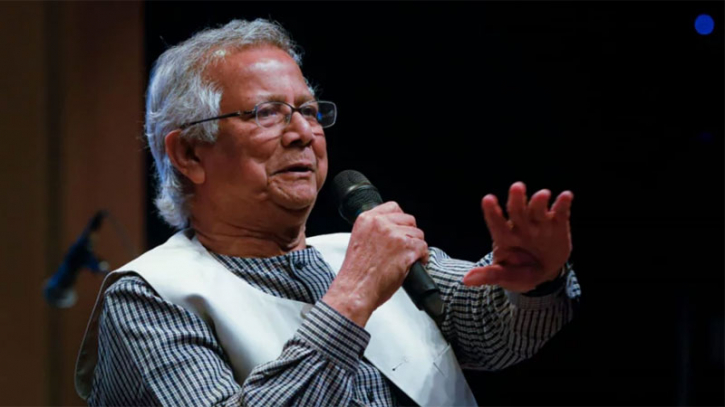Twelve angry men

The recent letter composed by 12 US senators addressed to Prime Minister Sheikh Hasina has sparked intense discussions within the political landscape of Bangladesh. The letter revolves around concerns regarding the trial proceedings involving Nobel laureate Muhammad Yunus, and it expresses hopes for his acquittal.
This issue has given rise to debates about whether such involvement amounts to international interference in the internal affairs of a sovereign nation.
Pertinent questions have been raised about the justification of top US senators intervening in the legal processes of another country. It is crucial to scrutinize the legitimacy of this unwarranted interference in the legal affairs of a sovereign nation.
Senators, including Senate Majority Whip Dick Durbin and influential figures like Senator Todd Young, Tim Kaine, and others, have collectively expressed their concerns over what they term as the “unrelenting harassment” faced by Muhammad Yunus.
The senators' letter calls upon Prime Minister Sheikh Hasina to address these concerns and halt what they describe as the abuse of Bangladesh's judicial system.
The letter alleges that Professor Yunus has faced over 150 “baseless cases,” and certain human rights organizations have highlighted "irregularities in legal proceedings" against him.
However, it is unlikely that police stations or courts would entertain baseless cases without prima facie evidence. For instance, aggrieved workers of Grameen Telecom, who were long deprived of fair wages, filed a case against him under prevailing labour laws.
Are these learned senators, despite everything, attempting to provide Professor Yunus with an unblemished character certificate, asserting that he is an infallible sage incapable of committing any crime? On what grounds do they declare him innocent despite numerous accusations from workers?
If the cases against him are indeed found to be unsubstantiated, the senators should seize this opportunity to substantiate their claims and promptly present evidence in court. If any irregularities are discovered in the legal proceedings against Yunus, they should bring them before the court and strive to have the cases dismissed.
If necessary, they can engage prominent defense lawyers from around the globe in order to secure the exoneration of this Nobel laureate.
Prime Minister Sheikh Hasina has consistently reassured that Professor Yunus is free to engage lawyers from any part of the world to advocate his case and secure a favourable verdict.
It is crucial for the well-wishers of the Nobel laureate in the US to recognize that Nobel laureates are not exempt from the law, and instances of Nobel laureates facing legal consequences are not unprecedented. In fact, there have been at least half-a-dozen instances where Nobel laureates have been implicated and are facing incarceration.
A specific excerpt from the court's 84-page judgement states: "Accused No 1, Yunus, despite being a Nobel laureate internationally recognized for his fight against poverty, is not being tried in this court as a Nobel winner. Rather, he is being tried in his capacity as the chairman of Grameen Telecom. The allegations of labour law violations against him have been substantiated."
Furthermore, the court granted him voluntary bail, pending an appeal to a higher court.
In response to the letter from the US senators, the Bangladesh government and some intellectuals have questioned the legality of such intervention, as the matter is sub judice.
It is a fundamental principle of law that no one, including the plaintiff and defendant, can make comments on a pending matter that may directly or indirectly influence the judicial process. Does the letter to US senators violate this universal legal requirement?
The backdrop of the legal case against Professor Yunus adds gravity to the situation. The charges involve actionable allegations of labour rights violations and financial irregularities, forming the foundation of the case.
While prosecutors assert that the charges are not politically motivated and are confined to Professor Yunus' actions at Grameen Telecom, the question remains whether Yunus is genuinely a victim of government political outrage, as he claims, or whether objectivity is lacking in this assessment.
The controversy surrounding Professor Yunus necessitates an examination of the issue of national sovereignty. What the senators have done amounts not only to unwarranted interference in another country's legal process but also an encroachment on its sovereignty.
A more constructive approach for the honourable senators would have been to assist Professor Yunus in securing legal aid.
Additionally, they appear unaware of the grievances levelled against Professor Yunus by the workers of Grameen Telecom.
In the event that the allegations are finally proven true, what will the senators do then? A fair and impartial trial is essential to allow legal proceedings to proceed without outside influence.
The foundation of any effective democracy rests on the independence of its legal system, and in Bangladesh, the culture of justice upholds judicial autonomy.
The senators' letter undermines a country's legal process free from outside influence, and contradicts the principle of non-interference in internal affairs, a cornerstone of international relations.
Confidence in the due process of law is vital, especially as Bangladesh's legal system presumes innocence until proven guilty, a principle that equally applies to Professor Yunus.
The letter from the US senators can be seen as a discourteous act of defiance against this basic principle of universal law. The legal process of the country should be trusted to arrive at a fair decision on the Yunus issue.
The government can challenge the legitimacy of the senators' letter through diplomatic channels, addressing arising situations through dialogue. To counter the senators' claims, government agencies should come forward to challenge the letter based on its misinformation, misconceptions, or allegations of legal process inadequacy.
Ultimately, reinforcing the concept of national sovereignty is a major responsibility of the government. Like any sovereign state, Bangladesh has the right to conduct its internal affairs independently of external pressure.
The senators' letter serves as a measure of the extent to which this fundamental right of the nation is respected.
Dr Rashid Askari is a bilingual writer, academic, translator and former vice chancellor of Islamic University Bangladesh.
Source: Dhaka Tribune.
.png)




